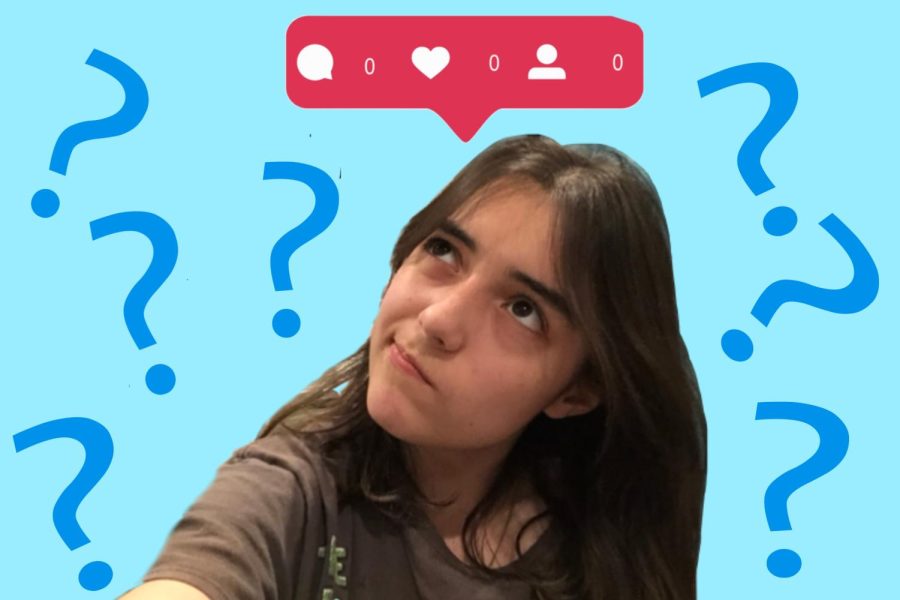Nobody likes Instagram
For Sara Green ’23, not getting likes is confusing, while getting lots of likes feels terrific.
I wake up to the obnoxious, blaring sound of a phone alarm. My hands instinctively fly to my nightstand, desperate to stop the wretched noise. Finally finding my phone, I tap the “turn off alarm” button. My thumbs are moving faster than my mind, and seemingly by muscle memory they enter my password, slide on my home screen and tap on the all-too-familiar, pink and yellow monster of an app that is Instagram.
Before I’m even fully awake, I scroll through an endless sea of memes, make-up tutorials and selfies of my friends. As I scroll, I don’t think about how funny the memes are or how I want to try the make-up tutorials for myself or even how cute my friends look (sincere apologies). Instead, all I can think is one thing: I am so sick of this app.
I don’t like Instagram because all it does is waste my time and make me feel insecure about myself and my accomplishments. At the same time, however, I don’t want to delete it. The more I’ve talked about this with my peers, the more I’ve come to realize that mine is a near universal experience for teenagers everywhere.
Nobody likes Instagram, so why is everyone still on it?
Research suggests that social media like Instagram is addictive because it perpetuates a loop: scroll, double tap to like, scroll, double tap to like. “It’s the pleasure of the repeat, the security of it,” Alexis C. Madrigal wrote in the Atlantic. The model of Instagram is similar to that of a Vegas slot machine; we scroll through content hoping to find something good that makes us happy, and we keep scrolling until we find that thing. Even when we find that cute dog video or beautiful sunset photo, however, the reward is not fulfilling enough to make us feel good about enough to walk away from the app. And so the cycle continues, and we keep scrolling.
I frequently notice this cycle in myself. I go on Instagram when I’m slightly bored, and before I know it, I’ve fallen down a rabbit hole of cooking videos or funny pictures, with no plans of walking away from my phone anytime soon. Scrolling is something that’s interesting enough to keep my brain occupied, all while not making me think too hard. In fact, scrolling on Instagram allows me to barely think at all. While at first this can be relaxing and stress relieving, after scrolling for hours on end, it doesn’t feel fun anymore.
This endless scrolling, though mindless, certainly is not harmless. After doing nothing but moving my finger and staring at a screen for hours on end, I feel unproductive, under-accomplished and insecure rather than relaxed and happy.
Instagram is somewhere where everyone puts their best foot forward. When your feed is filled with carefully edited selfies and meticulously picked outfit pictures, it’s easy to compare yourself — when you first wake up, without makeup, without filters — to those people on Instagram in their best times. Most of the time, I catch myself forgetting that most of what I see on Instagram is a highlight of others’ lives, not their genuine, everyday experiences. Because the app perpetuates the facade that the pretty-faced people I follow lead thrilling, exciting lives, I begin to feel that my own life is not as impressive as it should be. I begin to feel like my appearance is not as impressive as it should be. Simply put, Instagram makes me feel like I am not as impressive as I should be. This is the case for my fellow Tologs as well.
“It’s easy to catch yourself asking things like, Why doesn’t my stomach look like that? Why are my teeth not perfect? Things like that can be hard to ignore,” Riley Piken ‘25 said.
Besides directly comparing appearances, yet another form of comparison exists on the dreaded social media app. Comparison of numbers of likes and comments, along with numbers of followers, are big sources of insecurity on Instagram. It can be confusing when I post a picture I think I look good in, and it only gets half the amount of likes my other posts normally do. Once I start going through who exactly liked my post and who didn’t, it’s game over. As usernames fly past my eyes and I notice whose names are missing from the list, I feel even worse about myself than before. An anonymous Tolog agrees.
“I’m never like, I wish I looked like her, but I do find myself comparing my number of followers to other peoples’ or wondering why they have more than me… There’s times when I’m like, Why did they unfollow me? Who do I follow, and who doesn’t follow me back? Why am I losing followers? Why am I gaining followers? Stuff like that is really tiring,” this Tolog said.
As much as numbers on Instagram make me feel bad about myself, they are also what makes the app so appealing to me. I can’t deny that posting a picture of myself and checking my phone a few minutes later to see numerous likes and comments from people I barely even know makes me feel good. In the same way that I notice the usernames that are missing, I also notice the usernames that appear under the list of who liked my picture, feeling happy when I see people I want to impress. The notification that someone has commented on my post sparks excitement and anticipation. I find myself dying to know what my Instagram following has to say about my new haircut or favorite outfit. Call it superficial, because honestly, it is. To me the followers, numbers, likes and comments are at best encouraging and at worst addicting.
Ultimately, I think the reason Instagram is so hard to delete is because, while it’s the source of insecurities, it’s also the source of reassurance. Like a toxic partner, the app is the thing that hurts you but also the only thing that will comfort you. On Instagram, you can be upset because you have fewer followers than someone, then gain the same amount the next day and feel on top of the world. You can feel bad about your appearance, then in the same breath and tap of a button, receive validation in the form of likes and comments that you are as pretty as the person you were just comparing yourself to.
Some of my friends argue this cycle is worth it once you learn to look past it. I only somewhat agree. If you go onto Instagram seeking validation, then you will create an online presence around receiving that validation. If you go onto Instagram insecure, it will undoubtedly encourage and reinforce those insecurities. Perhaps the responsibility is not on the app to create a place where we don’t feel called to constantly scroll and compare ourselves to others but simply on us to not compare ourselves in the first place.
But how can someone not become addicted to an app when it is designed to be addictive? When its most basic structure relies on the fact that we will keep scrolling? How can someone not compare themselves to people on Instagram when it is constantly generating content that is painfully easy to compare themselves too? This is why I think the concept of looking past the toxicity of the app isn’t valid because the app, in its simplest form, is literally built upon being toxic and addictive.
So if I think Instagram is so bad, why don’t I delete it already?
Perhaps I’ve grown dependent on the security of having somewhere I can mindlessly scroll and double tap. Maybe, after years of being on Instagram, I’ve grown to need the reassurance the app provides in the form of likes and comments. A small, optimistic part of me might still be waiting for the day that I will be able to reach past the constant comparison and enjoy Instagram as a place to see funny memes and chat with my friends.
When I get so fed up with Instagram that I go to press the “delete app” button, it’s that small, optimistic part of me that wins out when I don’t follow through. I simply cannot resist the possibility that one day, I might find something good on the app; the slot machine psychology is working. And so, there I am scrolling again, hopelessly waiting to finally like Instagram.

Sara Green is the social media manager at the Veritas Shield and a senior on the Hill this year. She started working for the paper as a junior, and enjoys...

